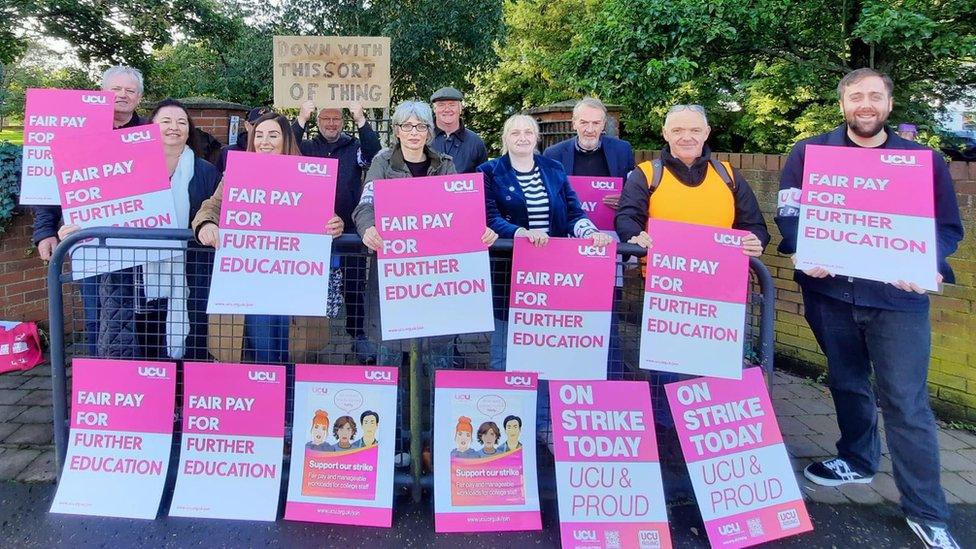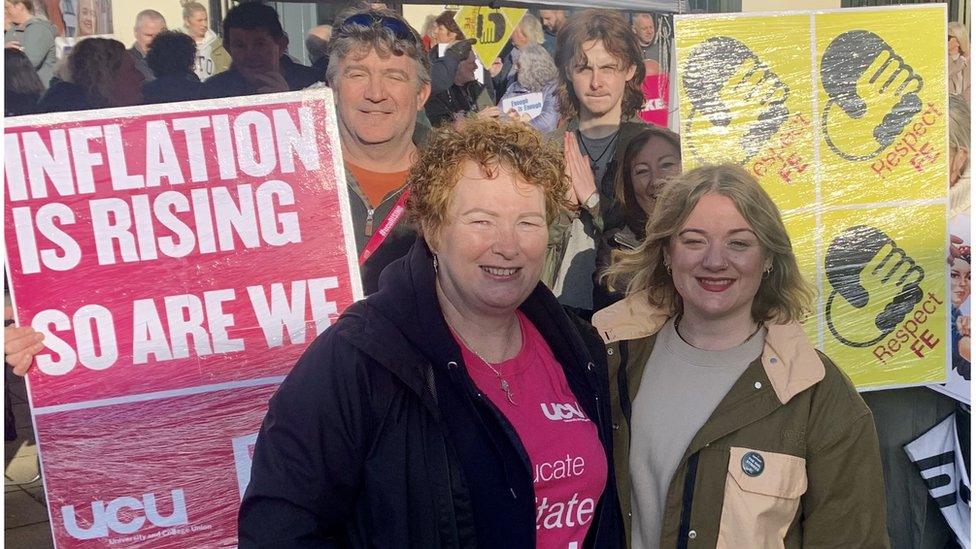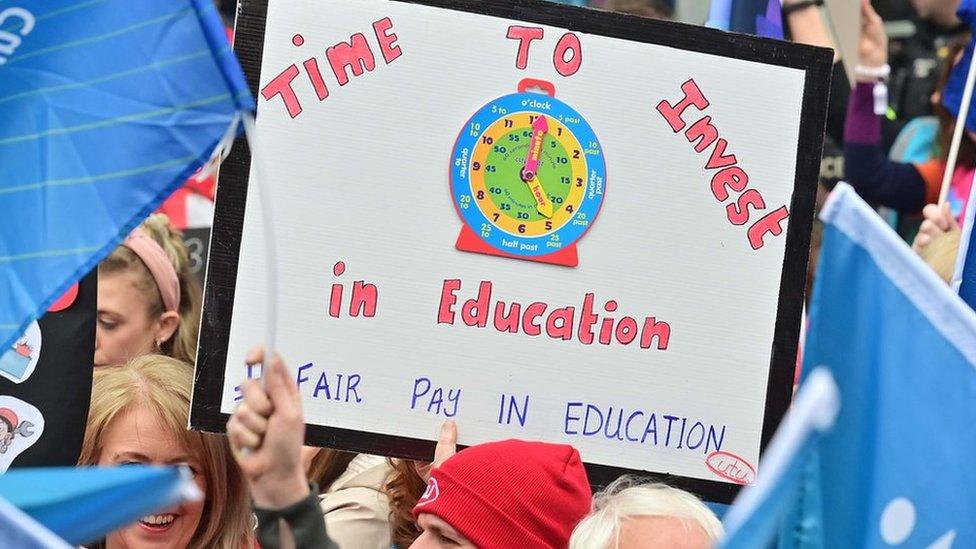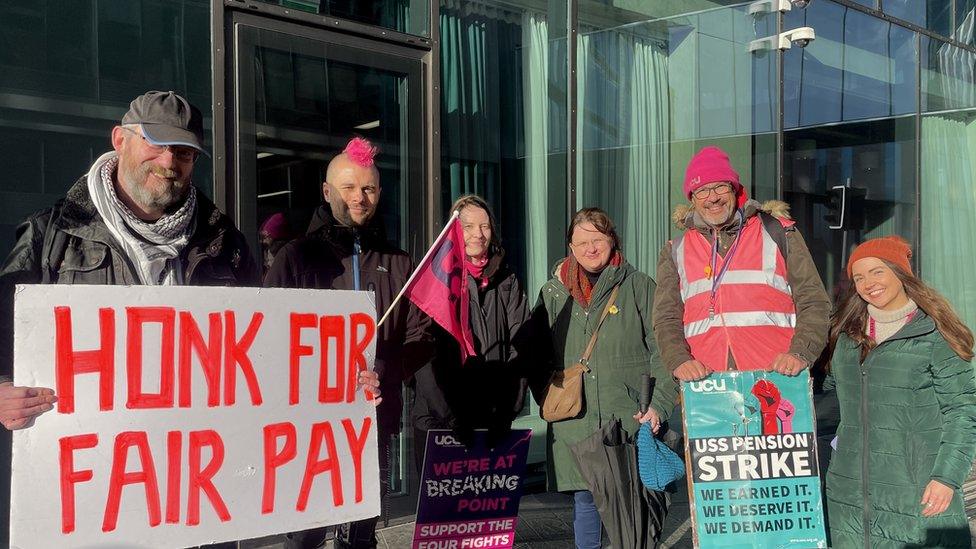Strike action: Further education staff begin week of walk-outs
- Published

Lecturers and staff at Northern Regional College (NRC) at a picket in Coleraine
Staff in further education (FE) colleges across Northern Ireland have begun a week of strike action in a dispute over pay and conditions.
Members of the University and College Union (UCU) in FE are then set to walk out every six days until December.
As the UCU represents the majority of more than 1,700 FE lecturers, the walkout is expected to cause widespread disruption to college courses.
Heads of further education colleges said the strike would hurt students.
Colleges were also facing "significant budgetary pressures", they said.
But the UCU said that since notice of industrial action was served, college employers had "not shown any willingness to resolve the dispute".

Katharine Clarke said lecturers in Northern Ireland have the heaviest timetable in the UK
UCU official Katharine Clarke said lecturers in Northern Ireland have the heaviest classroom timetable in the UK, which prevents them supplementing their pay with other jobs.
"If the weekly teaching hours were reduced, lecturers could boost their wages working part time in industry, which also provides opportunity for skill development that can only enhance the students' learning experience," she said.
"The employers' claim that they are powerless to resolve this dispute is false.
"The truth is they are unwilling to implement the contractual change necessary to improve working lives both qualitatively and financially."

Martina Donald (front left) says lecturers have been left with "no option but to go out on strike".
Martina Donald, a lecturer in applied science and the UCU branch secretary at the North West Regional College (NWRC) in Londonderry, said it was regrettable the strike had to happen but added that members are "incredibly angry".
"We haven't got a decent pay rise above 2% in the last ten years and lecturers have had enough," she said.
"We don't want any impact on students, but we have been left with no option but to go out on strike."
Ms Donald said their workload has been gradually increasing over the years, while their pay is gradually decreasing, and that situation is being exacerbated by the cost-of-living crisis.
"We need to stand up for our younger lecturing staff who don't realise what is ahead of them.
"They are going to be delivering on the ground until the age of 67 and won't have a pension to be able to look forward to and won't receive the remuneration they deserve.
"In some instances, we are delivering apprenticeships to apprentices who are actually being paid more than the lecturers who are delivering the courses on the ground."

Dave Cresswell said lecturers don't feel valued.
Dave Cresswell, a plumbing lecturer at South East Regional College, said they were striking for fair pay but also for respect.
"We've been undermined and we don't feel valued in our current jobs at the moment," he said.
Mr Cresswell said there will be no lessons taking place today, adding that "students will miss out on their first week of college which is important".
He said that lectures do not want to be on strike, "but unfortunately the management hasn't listened to us and we feel this is our only way of them being attentive to us".
'Pay decline'
The starting salary for a full-time further education lecturer in Northern Ireland is about £25,000 a year, although some staff are paid on an hourly basis or work part-time.
The UCU and NASUWT - which also represents some lecturers - recently called pay rises of 1% for 2021-22 and 1% for 2022-23 dismal.
Lecturers did get a recent £3,000 one-off pro-rata payment to help with rises in the cost of living.
But the UCU said the workload increase for lecturers was "comparable to the rate of pay decline".
In a statement, the College Employers' Forum (CEF), which represents college management, said the action would "have a negative impact on our learners who have only commenced the 2023-24 academic year".
"CEF has worked hard to make the case for an uplift in staff pay but unfortunately this comes at a time when there is huge financial pressure right across the public sector and our sector has not escaped these pressures," it said.
'Seek a resolution'
The Department for the Economy is the department with responsibility for further education in Northern Ireland.
It said: "The FE sector employers provided a pay remit business case to the Department for the Economy for the periods 2021-22 and 2022-23, which included increments, revalorisation and a one-off non-consolidated payment for FE lecturers.
"This pay award was issued by FE colleges in August.
"The department would encourage the FE colleges as employers to continue their engagement with unions to seek a resolution on ongoing pay issues."
Related topics
- Published15 September 2023

- Published24 April 2023
